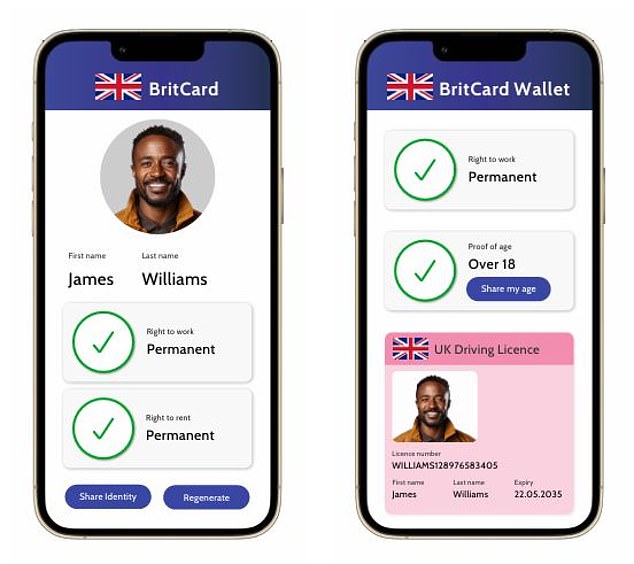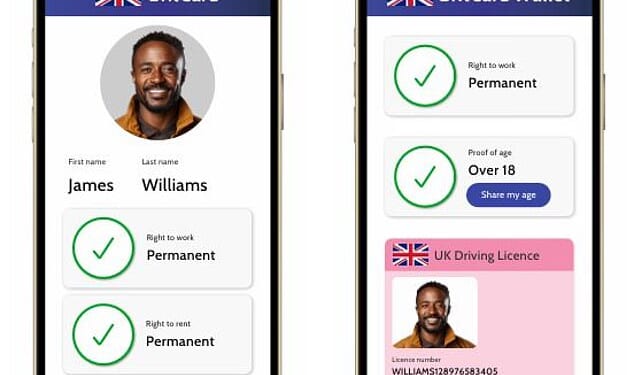Britons should be given a digital ID ‘superapp’ that allows them to do everything from proving their age in a pub to claiming benefits and reporting potholes, Tony Blair’s think-tank urges Sir Keir Starmer today.
Just days before the Prime Minister is expected to announce plans for an identity scheme to tackle illegal immigration, a new report by his predecessor’s influential organisation tells him to make it a ‘flagship programme’ used by everyone over 18 in the country.
The Tony Blair Institute (TBI) says that rather than creating a ‘papers, please’ society, it would instead bring ‘control and convenience’ to people’s interactions with the state.
Its new report says the system should become the ‘universal method for verifying identity’ and lists a huge number of ‘everyday tasks’ it could perform via a smartphone app rather than just proving the right to live or work in the UK.
These range from ‘proving their age to buy a pint at a pub’ to ‘reporting potholes’ and ‘finding a child’s school report’ as well as receiving ‘personalised health-prevention advice’ and ‘accessing benefits’.
The think-tank gives the example of parents having their digital IDs updated with their newborn’s name and NHS number as soon as their birth is registered.
Their income would then be checked and if they are below the threshold, ‘a message would pop up in the app to tell them they are pre-approved for child benefit’.
‘A digital ID ‘superapp’ should become the government’s flagship project – a symbol of tangible change and the Reimagined State in action,’ the report says.

The think-tank Labour Together, which helped Sir Keir Starmer become Prime Minister, has proposed a type of digital ID smartphone app called a ‘BritCard’
But Rebecca Vincent, interim director of civil liberties group Big Brother Watch said: ‘The Tony Blair Institute’s latest proposal is a clear attempt to pressure Downing Street into their version of a checkpoint Britain just days before Keir Starmer is expected to make an announcement on digital ID.
‘They’ve said the quiet part out loud, that it’s not only about tackling illegal immigration and that the Home Office is only the start, with pre-emptive plans for digital ID to creep into many aspects of our everyday lives.’
She has joined forces with the leaders of six other rights groups including Liberty and Unlock Democracy to write to Sir Keir today, urging him to ‘scrap any plans to introduce mandatory digital ID’.
‘A database which joins up all of our government-held records and logs our interactions with the state would be a treasure trove for hackers and malign actors, leaving us vulnerable to catastrophic data security breaches,’ they write.
But the TBI report claims that digital ID would be ‘more secure’ and private than existing citizens.
‘They put citizens in control of their data, bolstering transparency and making unauthorised access or significant privacy breaches like the Afghan data leak far less likely.’
It cites new polling which has found that 62 per cent of Britons are in favour of the introduction of digital ID, up from 54 per cent last year, with only 19 per cent against.
Alexander Iosad, Director of Government Innovation at TBI, said: ‘The value is clear, the public’s backing is clear; the government must now deliver it.
‘Digital ID will dramatically simplify your experience of government. It will mean that reporting issues, applying for benefits, sorting your tax code, or booking appointments, are all done in a few taps, or even automatically, not in hours, days, or weeks. It is a crucial foundation for a new model of services that come to you, when you need them, based on fairness, control and convenience.’
A UK Government spokesman said: ‘We are committed to using tech to make it easier for people to interact with the state, learning from other countries on how best to deliver this for citizens.
‘We will look at any serious proposals that would help people access public services, including digital ID.’











